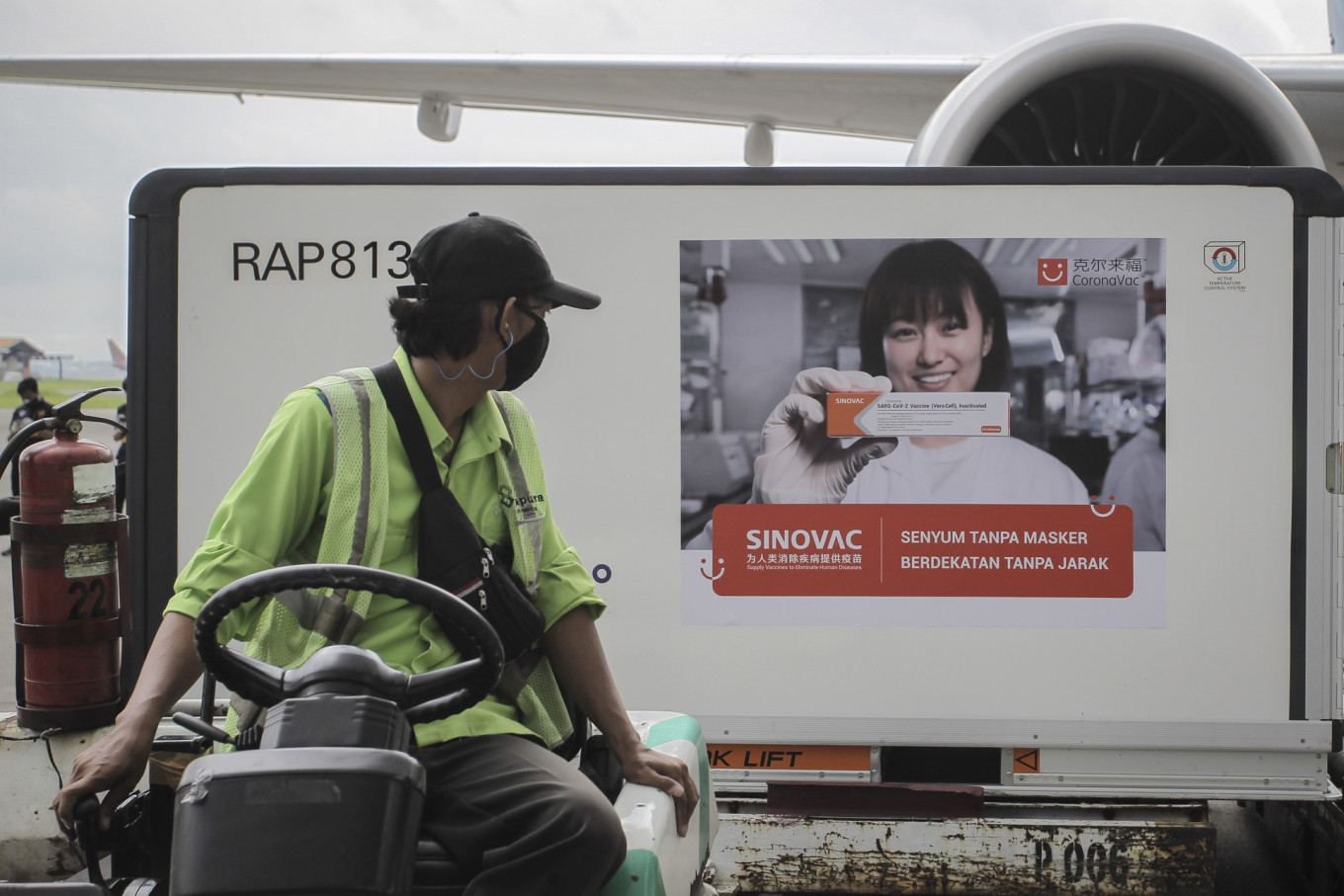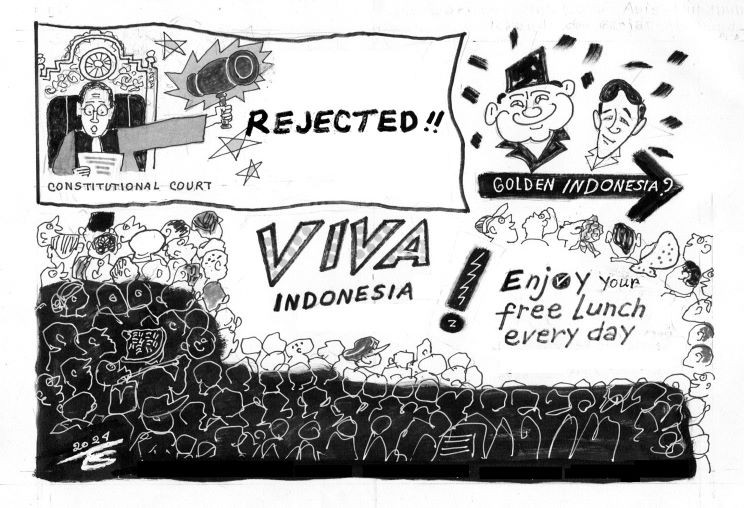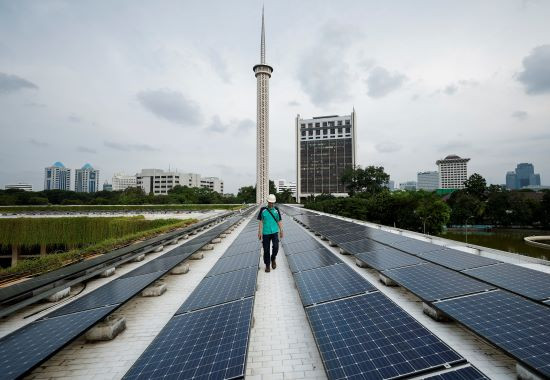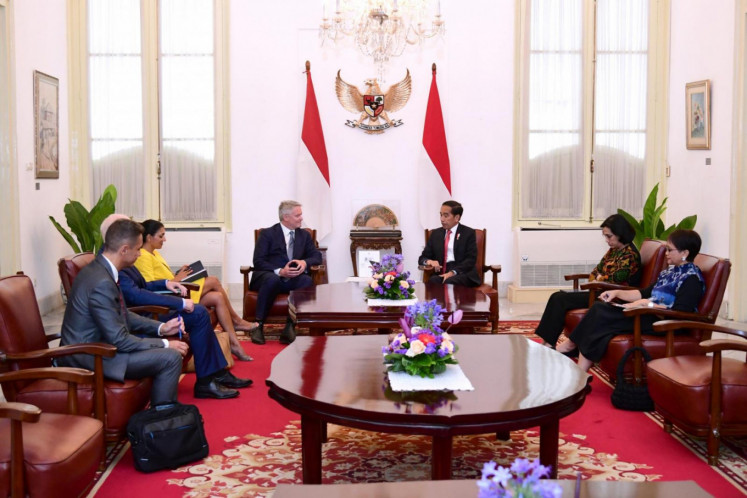Will Indonesia’s trifecta survive COVID-19?
A recent Morgan Stanley report has predicted that Indonesia will not only survive the crisis, but also enter a “Goldilocks” economy in 2021.
Change Size
 An airport worker transports a container of COVID-19 vaccines at Soekarno-Hatta International Airport in Tangerang, Banten on Jan. 12, 2020. Indonesia receives 15 million doses of COVID-19 vaccine produced by Chinese firm Sinovac Biotech Ltd. in this third consignment. The country had previously received 3 million doses from Sinovac. (Antara/Dhemas Reviyanto)
An airport worker transports a container of COVID-19 vaccines at Soekarno-Hatta International Airport in Tangerang, Banten on Jan. 12, 2020. Indonesia receives 15 million doses of COVID-19 vaccine produced by Chinese firm Sinovac Biotech Ltd. in this third consignment. The country had previously received 3 million doses from Sinovac. (Antara/Dhemas Reviyanto)
A
mitav Acharya’s 2014 book Indonesia Matters: Asia’s Emerging Democratic Power presented the idea of Indonesia’s “virtuous cycle” of democracy, development and stability. The book analyzed Indonesia’s story as a test of the compatibility between democracy and development and whether Islam, democracy and development can go hand in hand.
Indonesia is an important laboratory of this proposition, being the fourth-most-populous country in the word, the world’s largest Muslim majority country and the third-largest democracy.
For the past year, the COVID-19 pandemic, one of the biggest challenges of the century, has severely tested Indonesia’s democracy, development and stability. As of Saturday, the percentage of active case in Indonesia was 15.31 percent, lower than the global average of 26.52 percent. More than 94.2 million people have contracted the virus with more than 2 million deaths.
A recent Morgan Stanley report has predicted that Indonesia will not only survive the crisis, but also enter a “Goldilocks” economy in 2021 if it can play its strategic place in the post-COVID-19 pandemic period and global order of the 21st century. Are they being too optimistic?
The true test of a governance system will test how well it functions during a crisis.
Facing the urgency of arresting the spread of the virus, many countries, including democracies, have engaged in draconian measures. Governments around the world have closed borders and imposed lockdowns. While some of these are now being relaxed, there is reason for concern that governments might keep some of these measures to gain more control of the population, thereby threatening democratic politics.
Despite criticism that Indonesia’s government was slow to impose a lockdown, its partial and gradual restrictions have allowed its people to apply strict health protocols and at the same time maintain their political freedom and democracy. One example of this is the holding of successful regional elections simultaneously in 270 regions on Dec. 9, 2020 amid a COVID-19 surge.
The COVID-19 pandemic will judge both repressive and democratic systems.
The world’s democracies like Indonesia must set examples, and prove that democracy can not only be a powerful tool to resolve the pandemic at home, but can also contribute to global efforts to mitigate and address its social, economic and political effects. In the case of Indonesia, apart from importing 3 million vaccine vials and enough raw materials to produce 15 million doses for its people, “Indonesia’s vaccine diplomacy” also seeks to contribute to the interest of the world.
Since the beginning of the pandemic, Indonesia has voiced equal access to safe and affordable vaccines for all. That was also the main message of President Joko “Jokowi” Widodo at the UN General Assembly last year.
While keeping politics out of its pandemic response and dealing with it with transparency, Indonesia must also leverage its good relations with the world democracies and major powers of the Indo-Pacific to increase political coordination to better manage this crisis and to be collectively prepared for potential future pandemics at the regional and global level.
The world democracies must show their leadership in resolving the pandemic through a democracy-led process that promotes multilateral avenues.
On the development front, according to a paper published by the United Nations University World Institute for Development Economic Research, the economic impact of COVID-19 could increase global poverty for the first time in three decades, pushing more than 500 million people into poverty. Developing and least developed countries are most at risk. This study also shows that progress made on the 2030 Agenda of the Sustainable Development Goals (SDGs), particularly on no poverty and zero hunger, is under serious threat. COVID-19 could reverse a decade of global progress to reduce poverty.
While installing economic incentives, stimulus packages and social safety nets have been important to build economic resilience at home, bolstering international economic cooperation and innovation in the post-pandemic economic period is also critical. The pandemic caused Indonesia’s gross domestic product to contract 1 percent in 2020, and it is expected to grow 5.3 percent in 2021.
Indonesia must be able to work with other countries to bounce back, stimulate more economic initiatives and provide avenues to prevent a deeper economic downturn and crisis. Innovative cooperation between Indonesia and partner countries such as the United States, China, Japan and ASEAN neighbors is imperative.
Indonesia is working together with the US, China and the United Arab Emirates to explore the development of a vaccine for COVID-19 while securing equal access to the vaccine for developing countries once it becomes available.
Indonesia and the UAE recently agreed on the establishment of a safe travel corridor arrangement to facilitate and ease essential business travel between the two countries. It also agreed on similar arrangements with the Republic of Korea, China and Singapore.
International cooperation can go a long way in not only fulfilling a country’s urgent necessities for development and preventing a major economic slowdown, but also ensuring long-term sustainable development. But COVID-19 may challenge Indonesia’s ability to emerge as the fifth-biggest economy in the world in 2030, based on PricewaterhouseCoopers projections.
On the security front, according to a UN Secretary-General Report (S/2020/366), the COVID-19 pandemic may create incentives for some parties to conflict to press their advantage and seek opportunities to attack, which could lead to an increase in violence and civilian suffering.
As the world confronts the monumental challenge of the COVID-19 pandemic, the need to silence the guns could not be more acute. This is why UN Secretary-General António Guterres has urged parties to conflicts around the world to hold a ceasefire in order to facilitate efforts to address the pandemic.
Indonesia and ASEAN face no such situation at the moment where parties to conflict, domestic or international are using COVID-19 to press their claims. But the South China Sea remains an area of concern. Indonesia should push for an understanding that there should be no military action or act of strategic opportunism in the South China Sea to take advantage of the economic and social challenges posed by the pandemic.
The pandemic is still far from over and it will further test the country’s resilience. The right measures, however, will shape the country’s future, and preserve its virtuous trifecta of democracy, development and stability for future generations.
***
Purna Cita Nugraha is the deputy director of Middle East Affairs, the Indonesian Foreign Ministry, and the author of Opinio Juris 2011-2014. Amitav Acharya is a distinguished professor in international relations, American University, Washington, DC and the author of Indonesia Matters. The views expressed are their own.









